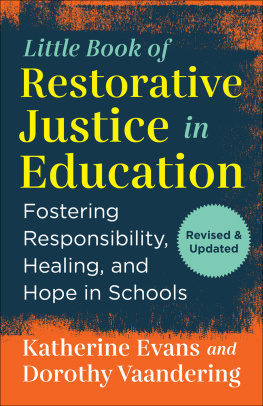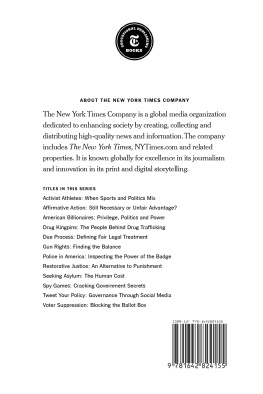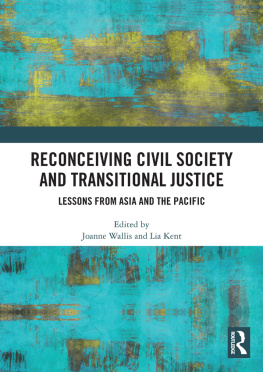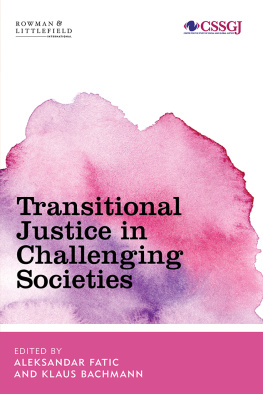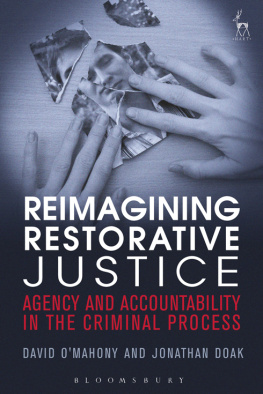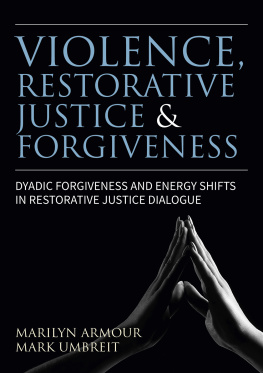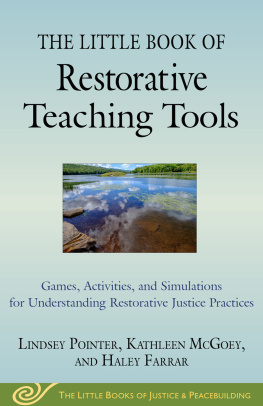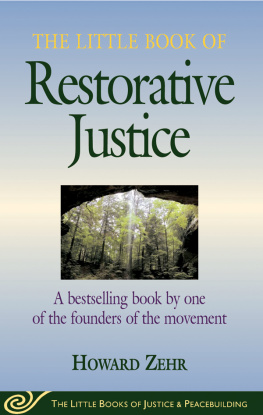This collection of provocative essays is the first attempt to expand the boundaries of restorative justice by tackling the myths that surround its definition and capabilities and by imaginatively addressing how its tenets can make transitional justice practice more relevant to those affected by direct and structural violence. By moving beyond the toolkit of supposed restorative practices in transitional justice, these essays challenge the reader to reconceptualize the meanings of justice away from the perpetratorvictim dichotomy towards a transformational vision of societal change.
Professor Harvey Weinstein, Senior Research Fellow, Human Rights Center; Clinical Professor (Ret.), School of Public Health; Co-Editor-in-Chief Emeritus, International Journal of Transitional Justice, Berkeley, USA
This volume is simultaneously critical and inspirational. The authors reflect honestly on the deep structural challenges and the intense personal dimensions of addressing mass human rights violations while exploring options for navigating this complex terrain. The authors provide carefully considered and innovative suggestions for how restorative responses can be more effectively integrated into transitional justice approaches. These ideas present a timely challenge and stimulus for transitional justice scholars, practitioners and policy makers.
The key argument of this volume, that restorative justice can be used as a mechanism or lens through which local actors can claim a more significant stake in dealing with the past while building their future, is an important reminder of the transformative potential inherent in transitional contexts. This volume points to how this potential can be promoted through critical and creative scholarship.
Dr Hugo van der Merwe, Head of Research, Centre for the Study of Violence and Reconciliation, South Africa
Restorative Justice in Transitional Settings demonstrates how much needed and how fruitful it is to broadening, to deepening and to lengthening the concept of restorative justice. Through critical analysis of existing practices and opening up new perspectives, a well-selected group of international scholars explore the plural character of justice from different angles. This edited collection highly contributes to both our understanding and designing of innovative restorative justice approaches in a variety of societal and cultural contexts.
Professor Dr Ivo Aertsen, Director KU Leuven Institute of Criminology (LINC), Belgium
Many academics and activists have been pushing the envelope for a number of years in terms of the promise of restorative justice in transitional settings. Kerry Clamp has put together a collection of some of the most important voices in the field and the results are impressive. What is needed is precisely such a cold-eyed, pragmatic yet ambitious assessment of the possibilities and pitfalls of restorative justice in such contexts. This book is a must-read for anyone interested in the topic. Clamp and her contributors are to be warmly congratulated for putting it together.
Kieran McEvoy, Professor of Law and Transitional Justice, Queens University Belfast
A compilation of very good theoretical and empirical studies by leading scholars on a subject that is academically underdeveloped but of growing practical importance. You can agree or disagree with the conclusions of the authors but this book is a must read for all interested in the crucial subject on what is the best way for emerging democracies to deal with past atrocities.
Rodrigo Uprimny, Professor of Law, National University of Colombia and Executive Director of the Center of Studies Dejusticia
Restorative Justice in Transitional Settings
Restorative justice is increasingly being applied to settings characterised by large-scale violence and human rights abuses. While many embrace this development as an important step in attempts to transform protracted conflict, there are a number of conceptual challenges in transporting restorative justice from a democratic setting to one which has been affected by mass victimisation or civil war. These include responding to the seriousness and scale of harms that have been caused, the blurred boundaries between victims and offenders, and the difficulties associated with holding someone to account and compelling reparative activities. Despite reams of paper being devoted to defining restorative justice within democratic settings (where the concept first emerged), restorative scholars have been slow to comment on the integration of restorative justice into the transitional justice discourse.
Restorative Justice in Transitional Settings brings together a number of leading scholars from around the world to respond to this gap by developing and further articulating restorative justice for transitional settings. These scholars push the boundaries of restorative justice to seek more effective approaches to addressing the causes and consequences of conflict and oppression in these diverse contexts. Each chapter highlights a limitation with current conceptions of restorative justice in the transitional justice literature and then suggests a way in which the limitation might be overcome.
This book has strong interdisciplinary value and will be of interest to criminologists, legal scholars, and those engaged with international relations and peace treaties.
Kerry Clamp is a Senior Lecturer in Criminology in the Department of Social Sciences and Psychology at the University of Western Sydney. She received her Ph.D. from the University of Leeds in 2010 and also holds degrees from the University of Sheffield and the University of South Africa. Her research agenda focuses on the intersections of restorative justice and transitional justice, and of restorative justice and policing.
Routledge frontiers of criminal justice
1 Sex Offenders: Punish, Help, Change or Control?
Theory, policy and practice explored
Edited by Jo Brayford, Francis Cowe and John Deering
2 Building Justice in Post-Transition Europe
Processes of criminalisation within Central and Eastern European societies
Edited by Kay Goodall, Margaret Malloch and Bill Munro
3 Technocrime, Policing and Surveillance
Edited by Stphane Leman-Langlois
4 Youth Justice in Context
Community, compliance and young people
Mairead Seymour
5 Women, Punishment and Social Justice
Human rights and penal practices
Margaret Malloch and Gill McIvor
6 Handbook of Policing, Ethics and Professional Standards
Edited by Allyson MacVean, Peter Spindler and Charlotte Solf
7 Contrasts in Punishment
An explanation of Anglophone excess and Nordic exceptionalism
John Pratt and Anna Eriksson
8 Victims of Environmental Harm
Rights, recognition and redress under national and international law
Matthew Hall
9 Doing Probation Work
Identity in a criminal justice occupation
Rob C. Mawby and Anne Worrall
10 Justice Reinvestment
Can the criminal justice system deliver more for less?
Chris Fox, Kevin Albertson and Kevin Wong
11 Epidemiological Criminology
Theory to practice
Edited by Eve Waltermaurer and Timothy A. Akers
12 Policing cities
Urban securitization and regulation in a 21st century world



